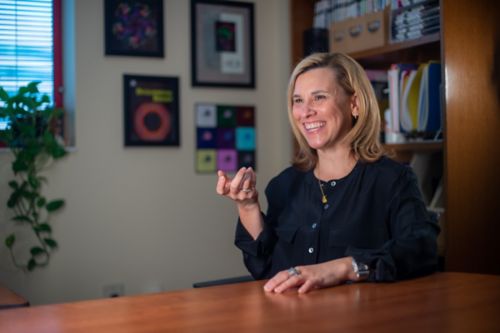St. Jude Family of Websites
Explore our cutting edge research, world-class patient care, career opportunities and more.
St. Jude Children's Research Hospital Home

- Fundraising
St. Jude Family of Websites
Explore our cutting edge research, world-class patient care, career opportunities and more.
St. Jude Children's Research Hospital Home

- Fundraising
Lessons Learned: How to Mentor Scientists

Stacey Ogden, PhD, associate member in Cell & Molecular Biology, recently spoke to the St. Jude Postdoctoral Leadership Council and the Postdoctoral Association, which recognized her as the 2021 Mentor of the Year. Ogden was lauded for her efforts to build a supportive lab environment so her trainees can excel. Follow her on Twitter.
Since new principal investigators (PI) are starting their labs now, and postdocs are hitting the job market, I wanted to share mentoring lessons I’ve learned as a PI over the last 15 years.
Mentoring Styles
Your mentoring style will be a combination of your previous mentors’ styles. It will be influenced by your team members and will change throughout the years.
- Be adaptable. What’s in style for mentoring one year may be out the next.
- Remember that mentoring is coaching. Find a trustworthy assistant coach to help with day-to-day logistics and mentor junior team members.
- Consider experience. Mentor to your team members’ experience levels. You should mentor an undergraduate summer student differently than you mentor a graduate student or a senior postdoctoral fellow.
- Know your lab members’ goals. Customize projects to their individual interests, aptitudes and experience.
Collaboration is Key
- Stay engaged in the research.
- Solicit input from team members about the direction of their projects.
- Allowing project overlap between individuals in your group is OK. Everyone has their own part in a collaboration.
- Keep the lines of communication open. Be approachable, and let your lab know you want to hear their concerns.
- Check your ego. Good ideas come from everyone; they don’t all have to come from you.
- Remember your success is intertwined with your team’s success. Team members sometimes have a better handle on project details, so consider their suggestions.
Lab Dynamics
- Hire thoughtfully. Lab dynamics and personality are extremely important.
- Involve current lab members in recruiting. Every team has a vibe and you want new employees to feel at home.
- Remember camaraderie leads to good ideas. Cohesive teams enjoy working together and socializing together.
Conflicts and Expectations
- Don’t let problems fester. Discuss issues when everyone is calm.
- Let people vent. Don’t underestimate the power of really listening to someone who is upset.
- Always have a box of tissues nearby because people will cry in your office. Don’t be afraid to say, “I'm sorry. I don’t know. How can we fix this?”
- Be clear about expectations. Try not to make or accept excuses.
- Remember your lab is a training environment and mistakes will happen. Acknowledge them and move on.
- Document successes and concerns through annual reviews and/or goal discussions.
You’ve Got This
- Being a PI is not easy. You will have bad days. You will be stressed out. Do not take frustrations out on your team.
- Resist negativity. Keep your sense of humor—it will get you through a lot.
- Avoid watching the clock. A long day does not equal a productive day. Everyone needs downtime, including you.
- Celebrate! Celebrate the big stuff. Celebrate the small stuff. Have team happy hours. Do team-building activities.
- Write down advice that sticks with you. Advice from mentors that still resonates with me:
- Loyalty should go down, not up, the chain of command.
- Once your lab reaches a certain size, someone will always be a little bit mad at you, and that’s OK.
- Get to know the people with whom you work.
I hope this is helpful for new PIs and soon-to-be mentors. To those in the job market: best of luck with your search. To those just starting your lab: take it one day at a time. Build your nest. Mentor others.






